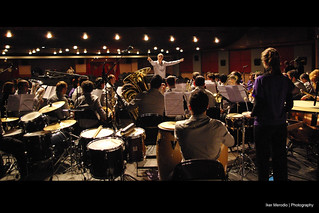
One positive trend in band and orchestra classes is the increasing focus on authentic individual assessment. Band and orchestra teachers are doing a much better job at finding out what students know and can do in regards to individual technique, expression, and so on. Assessments, both formative and summative, are leading to refined instruction and grades that are more genuine. At the same time, this movement seems to have led to the unfortunate position that what the student demonstrates outside of rehearsal is the only measurable aspect of what students have learned. In fact, if we got into the nitty gritty of some ensemble syllabi we would find that students in many band and orchestra classes could skip all of the rehearsals and the concert, yet as long as they completed all of their individual performance assessments, they would pass...perhaps even with an A. Yet where do we spend most of our instructional minutes, and why? As we all know, what we value is borne out in our actions, so clearly music educators value the process of bringing printed music to life and sharing it with an audience. But if evidence of learning is required in order to justify how we spend our time (a fair expectation), and we have no evidence of ensemble learnings, then rehearsals (and performances) are by definition superfluous...right? How does that sit with you?
I find this trend disturbing on so many levels. I think most of us would agree that the processes and intricacies of students bringing ensemble music to fruition (and sharing it publicly) should comprise the core of any ensemble class. True, individual proficiency sets the stage (literally) for ensemble music rehearsing/performing, and is therefore essential. But once that stage is set, what are we teaching our students about ensemble musicianship, and how do we know they are learning it? I believe it is our inability to clearly address those questions that is leading to administrators telling teachers that they cannot require students to "participate" in concerts, or that a student who will not be a productive collaborator in rehearsal must be treated as a "behavioral" matter. Yet if these same students do not turn in their assessments in their other classes, what happens? If a student is a member of a group project in social studies and does no work, what is the result, and why? Do you see the disconnect here? Now think about the importance that administrators place upon classroom observations in determining teacher effectiveness. They are typically observing our rehearsals...so clearly they believe there must be some learning taking place in that setting, right? And if so, there will be assessment (whether formative or summative), and there will be credit given. So...is there?
We have a lot of work to do on this issue. The fact is that we have been allowed to be mysterious about "what's going on in there" for too long, and now we are being told that rehearsals and performances have no place in our curricula. But we know that ensemble music is an authentic form of positive interdependence (perhaps the most authentic). We know that our students need concert performances (the presentation of the "group project") in order to complete their learning cycles and reap the most meaningful benefits of music performance. We need to articulate the aspects of being an ensemble musician, be more intentional about sharing the what/why/how of "ensemble technique" with our students, and devise authentic ways to measure it. Otherwise we might as well split our ensembles into "like" instruments, cancel the concerts, and treat our courses like class piano. If ensemble matters, it's time to articulate what we're really doing "in there."
Afterword:
Recently the Band Directors Group has been talking about what students should be doing in order to have productive rehearsals. This brainstorm list may be a starting point for creating lessons and other resources that will help students learn about the important aspects of becoming a great ensemble musician:
- Eye Contact
- Marking Parts
- Correct Posture
- Adjusting (Pitch) without being told
- Asks clarifying/thoughtful questions
- Helpful towards others (kindness)
- Responsive to conducting gestures
- Problem solver (musically and otherwise)
- Productive with "downtime"
- Initiates discussions about the music with others
- Pleasant disposition
- Does not give up
- Has the pulse internalized
- Takes creative interpretive/expressive risks with regularity
- Holds peers accountable
- Prepared musically (and equipment-wise) for rehearsals and performances
- Interested in (and enjoys) the success of others, not just themselves, for the sake of the music being the best it can be
- Takes instruction/criticism with a positive nature...understands its importance
- Retains previous concepts and can apply them to new situations
- Is thinking about solving musical problems rather than immediately asking for the answer
- Can identify elements that are incorrect while they are happening (in themselves and across the ensemble)
- Can provide effective evaluation of the piece at various points in the learning cycle
- Is always on time and ready to collaborate
- Can alter the shape of their sound to accomodate different blending situations and other requirements of the composition